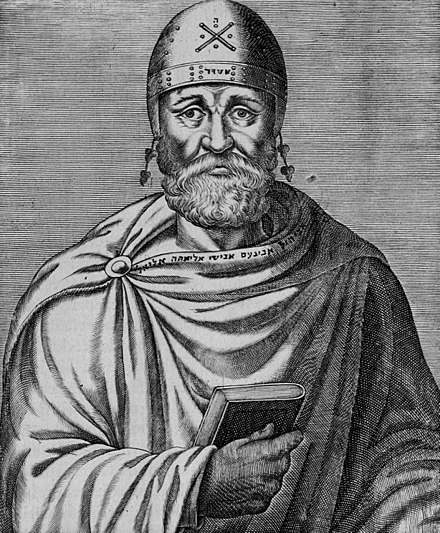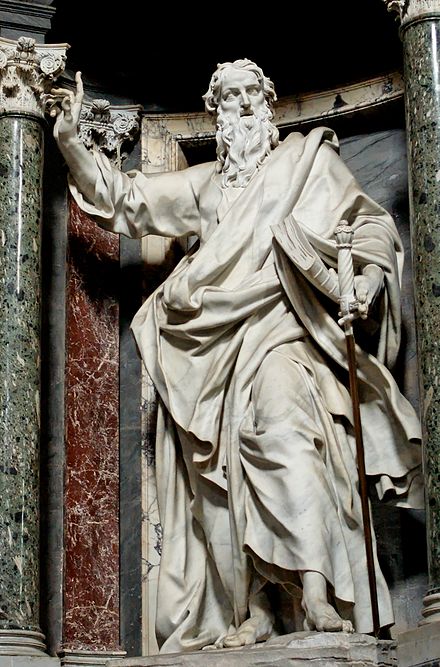“The highest achievement is to be without fault like God and to become a God-like man. This, of course, is what Christ is talking about when he speaks of aligning your will with God’s will. Philo goes on to clarify that metanoia (which he makes clear is a transformation of self, not simply regret or repentance of some wrongdoing) leads to this state of perfection whereby one becomes a Son of God. Not just any Son of God, but he terms those who achieve this state as the “eldest Son of God,” God’s ‘first-born’.” (Tim Langdell)
“What Philo describes as a universal cosmic aspect of God, the aspect humans can merge with, Paul, the writer of John, and others converted this universal idea into a narrow idea that only referred to a single person, a ‘Messiah’.”
(Tim Langdell)
Did Jesus speak Greek?
Langdell writes: “Metanoia is of course a Greek word, and as we know the New Testament was written in Greek, whereas we believe Christ spoke primarily Aramaic. In fact, it may surprise some to learn that the Hellenistic cultural center of Alexandria in Egypt had a larger Jewish population than Jerusalem in the first century. Indeed, more Jews in that period spoke Greek than spoke Hebrew. Moreover, many of the Jews in Alexandria spoke mainly Greek and may have had little to no knowledge of Hebrew or Aramaic. So, did Christ speak Greek? New Testament scholars say that he may have; while it is not clear from any specific passage in the Gospels, certainly he appeared not to need a translator when speaking with the Roman authorities – and they would have spoken Greek.”
As Greece and Israel are now seen as belonging to quite different cultural spheres, it is easy to forget that Alexandria, which had been founded by Alexander the Great in 331 BCE, was the “intellectual and cultural centre of the ancient Mediterranean for much of the Hellenistic age and late Antiquity.” It is located in what we now identify as Egypt, but it could just as well have been located in Greece. And even though, at the time of Jesus, it had become part of the Roman empire, Greek was still the lingua franca among the intellectuals from all over the known world exchanging ideas there. Jesus was indeed a Jew, and what he taught can to some extent be traced to Philo, another Jew, but Philo lived in Alexandria, and taught in Greek.
So, Langdell argues: “It is thus possible that Christ himself adopted the word metanoia in his teaching precisely because no Aramaic or Hebrew word quite captured the meaning he sought of “transformation.” If not, then translators of his teachings would have chosen the word metanoia as“ a better translation for Jesus’ words.”
“What we do know,” Langdell asserts, “is that metanoia is in many ways unique to the time of Christ, or at least rose in popularity as Christianity took root and grew.” In the Greek translation of the Hebrew Bible – known as the Septuagint – which had been carried out in the second and third centuries before the common era, the word metanoia had appeared only ten times.
On the other hand, Langdell notes, “The two words most used in the Hebrew Bible for regret and repentance are shuv and naham … but ultimately the Greek word used to translate them prior to the common era was consistently epistrophe or some variant on the Greek word strophe or some variant on the Greek word strophe (turn).” So the Greek word for repentance was a word containing the ending strophe, it was not metanoia. The popularity of the word metanoia began with the works of Philo, who is believed to have been one of Jesus’s teachers, and it grew during Jesus’s lifetime and the centuries that followed. Specifically, “there are only 95 instances of the word metanoia in all Greek literature prior to the time of Christ. By contrast, [a scholar named] Guy Nave found over a thousand uses of the word metanoia in texts written from 1 CE to 200 CE, showing the immense popularity the term had suddenly gained as a result of Christ’s teachings.” Langdell thinks that “It is clear, then, that the writers of the synoptic Gospels used the term metanoia specifically and deliberately to translate Christ’s teaching about transformation.”
Note, however, that the “strophe” ending in the words used for repentance, meant “turn.” Epistrophe” had been used in the early Christian world to mean “conversion.” And metanoia likewise “connotes a sense of turning away from how things were before, and this aspect of its meaning perhaps led to the mistranslation of repentance. It is a dropping away of the prior life a follower had, giving up an attachment to material things, living a simpler life, and so on. But the word clearly carried a much deeper meaning in its context: it meant both a 180 degree turn away from the life previously led, and also a 360 degree turn back to the state of your true Self (your state of being a Son of God, your will and God’s will in alignment), the state that had always been there.”
Philo of Alexandria frequently spoke of metanoia

Langdell writes: “A Jewish philosopher and teacher, Philo (20 BCE-50 CE) was a highly respected leader among the Jewish population in Alexandria at the time of Christ. He was also a leading syncretist of that time, seeking to find commonalities between the Hebrew Bible and Hellenistic philosophy. He relied upon the Septuagint (written in Koine Greek) since he does not appear to have been skilled in Hebrew and focused on integrating the Bible with Platonic and Stoic ideas. At the peak of his career he was in his forties and fifties, at the time that Christ would have been in his twenties to early thirties. Philo died in 50 CE which means he died before any of the extant Christian texts we know of were first written. The earliest Christian texts appear to be some of Paul’s letters written around 50-55 CE, and the earliest Gospel seems to date from a decade or more after Philo died.” Since Philo was a famous teacher at the time, while Jesus was only known in a narrow geographic region, it seems likely that, if Jesus could read Greek, he could very well have read some of Philo’s works.
In these works, there are three terms, used frequently by Philo, that one also finds in Jesus’s teachings: metanoia, Son of God as applied to someone who has attained “the highest level of self-transformation,” and logos. In fact, Langdell remarks: “What may be shocking is that these terms, these ideas, came out of Alexandria prior to the time when Christ first started teaching.”
In his work On the Virtues, Philo devotes an entire section (XXXIII) to metanoia, which he presents as the transformation which turns an ordinary “child of God” into a true “Son of God” through the union of God as father and Sophia (wisdom) as mother. In Philo’s words:
“the brother and closest relation which is metanoia, which is not indeed ranked in the first and highest class of blessings, but which has the principal in the class next to the first. For absolutely never to do anything wrong at all is a peculiar attribute of God, and perhaps one may also say of a God-like man.”
Then in On Flight and Finding, Philo adds: “God being his father, who is also the father of all things, and wisdom being his mother, by means of whom the universe arrived at creation.”
Langdell asks: “Might this be a possible source for Christ’s teaching that to achieve metanoia, to enter the Kingdom on earth (Heaven within), a follower needs to be born again of the Father and the Spirit? Yes, since Philo is reported to have been heavily influenced by the Essenes and the Therapeutae and since Christ was a Teacher in the Jewish Wisdom Tradition, it does seem likely he drew upon Philo’s writings.”
Already in Philo, is found the idea that “the highest achievement is to be without fault like God and to become a God-like man. This, of course, is what Christ is talking about when he speaks of aligning your will with God’s will. Philo goes on to clarify that metanoia (which he makes clear is a transformation of self, not simply regret or repentance of some wrongdoing) leads to this state of perfection whereby one becomes a Son of God. Not just any Son of God, but he terms those who achieve this state as the “eldest Son of God,” God’s “first-born.” And you will notice, too, Philo’s use of the term Father or “Father of the universe” for God. The language is like that used by Christ later, and some of the ideas are identical to those who invented the post-Easter Jesus when they described Christ as the logos.”
The word “logos” had, and still has, many meanings. The meaning Philo was engaged with was that of divine mind – God as he who “thinks”and “speaks” the world into existence. Through metanoia, the seeker becomes a “Son of God,” and shares God’s mind – logos. In On the Confusion of Tongues, Philo says: “For the Father of the universe has caused him to spring up as the eldest son … the firstborn; and he who is thus born, imitating the ways of his father.” In other words, being God-like, he/she thinks like God. Then Philo clarifies:
“but they who have real knowledge, are properly addressed as the Sons of the one God … And even if there be not as yet anyone who is worthy to be called a Son of God, nevertheless let him labor earnestly to be adorned according to his first-born word … for he is called, the authority, and the name of God, and the Logos, and man according to God’s image … For even if we are not yet suitable to be called the sons of God, still we may deserve to be called the children of his eternal image, of his most sacred word; for the image of God is his most ancient Logos.”
Since the threefold association of metanoia as a process of transformation, the concept of Son of God and that of Logos are already present in Philo, we can assume that “Christ used or was strongly influenced by, Philo’s writing.” Langdell, however, adds that “Philo’s work was also relied on heavily to craft the post-Easter Jesus.”
Philo’s work was also relied on heavily to craft the post-Easter Jesus
Langdell writes: “A use of Philo’s thought is most clearly shown in the Gospel of John which opens by almost directly quoting from Philo (Jn 1:1-5):
“In the beginning was the Logos, and the Logos was with God, and the Logos was God. He was with God in the beginning. Through him all things were made; without him nothing was made that has been made. In him was life, and that life was the light of mankind. The light shines in the darkness, and the darkness has not overcome it.”
This “heavy” reliance of the writer of the Gospel of John and Paul on Philo’s writings could, to some extent, “muddy the waters,” and make it more difficult for us to recover what the pre-Easter Jesus actually taught.

Langdell lists the main ideas that were borrowed from Philo in the context of the post-Easter Christ: “For Philo, the Logos is eternally begotten of the Father, which is how he refers to the Supreme Being, and this Logos is the mediator between human beings and God (Concerning Noah’s Work as a Planter, 9-10). He also wrote that to human beings the divine appears as a triad – the Father, the Logos, and God’s actions in the world. Thus, from Philo’s work, Paul and the writer of John merged the ideas into this new invented “Christianity” of a Trinity (Father, Son and Holy Spirit) that Philo had written about, along with the specific ideas that the Son is eternally begotten of the father (Nicene Creed), Light from Light, true God from true god, and that the Son is the mediator between humanity and God.”
Langdell, however, draws our attention to a key difference between Philo’s concept of Logos and that of the post-Easter Christ: “For Philo the Logos was not a person, not an individual like Jesus, the Logos is an aspect of God, God’s shadow or twin. In Philo’s philosophy, then, the Logos is accessible to anyone who achieves unity with the Father, and thereby becomes a ‘first-born Son’ or ‘eternally begotten Son’ as Philo described all those who achieve enlightenment. Thus, what Philo describes as a universal cosmic aspect of God, the aspect humans can merge with, Paul, the writer of John, and others converted this universal idea into a narrow idea that only referred to a single person, a ‘Messiah’.”
For Philo, as for the Buddha, anyone engaged in a serious practice, can achieve metanoia/awakening. But in Christianity as it was taught at Sunday schools and in the priests’ sermons at Sunday mass, only Christ had been able to become a true “Son of God.” Added to teachings that describe all people as born sinners, and in danger of going to hell after death, a translation of metanoia as mere “moral” repentance of one’s sins was all that was on offer to the ordinary church-goer.
To be fair, one must add that, among the educated, a rich apophatic tradition emerged in the centuries following the crucifixion, and developed throughout the Middle Ages, though not without resistance from the papal authorities – mystics were pursued for heresy, some of them, to be safe, wrote under the cover of anonymity. And it is also the case that, even though the Buddha had taught that anyone could become “enlightened,” lack of time for practice, and access to teachers prevented most ordinary Buddhists from seeking anything other than a more favorable rebirth.
Source:
Tim Langdell – Christ Way, Buddha Way
